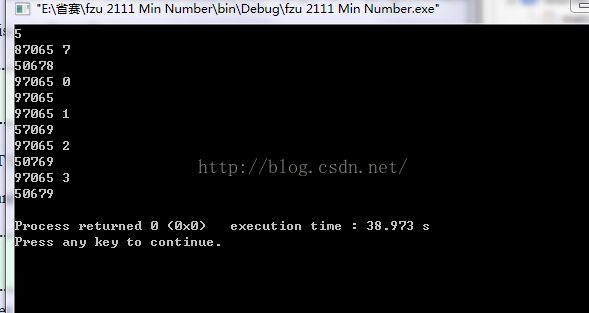fzu 2111 Min Number 搜索
题目大意:
在t组测试用例中,
给你一个数n 和 m,要求交换m次a[i]和a[j](i<j)得到的最小数,输出这个最小数
解题方法:
显然每次都是将最小的值移到前面去,那么我们用i记录已经确定了几个最小的值,
每确定一次就将最小值移到当前的下标,否则m++,继续找,
首位为0处理,用continue直接跳过;
扫描a[i],每次定位a[i],若此时a[i]不是最小的,如果a[i]<a[j]则交换一次值和下标; 若是最小的,m++,继续找;
而当i>=len,便不需要再交换了,直接输出最小
代码:
#include <iostream>
#include <cstdio>
#include <cstring>
#include <algorithm>
using namespace std;
const int MAXN = 1000;
int a[MAXN];
int t,n,m,cnt,minn;
int main()
{
cin>>t;
while(t--)
{
cnt=0;
scanf("%d%d",&n,&m);
memset(a,0,sizeof(a));
while(n)
{
a[cnt++]=n%10;
n/=10;
}
for(int i=0; i<cnt/2; i++)
swap(a[i],a[cnt-i-1]);
///重点从此次开始
for(int i=0; i<m; i++)
{
if(i>=cnt)
break;
minn=a[i];
int index=i;
for(int j=i; j<cnt; j++)
{
if(a[j]==0&&i==0)///处理首位不为0
continue;
if(minn>a[j])
{
minn=a[j];
index=j;
}
}
if(minn==a[i])
m++;
else
swap(a[i],a[index]);
}
for(int i=0; i<cnt; i++)
printf("%d",a[i]);
printf("\n");
}
return 0;
}
![]()
另附break与continue区别:
//break是结束整个循环体,continue是结束单次循环
比方说:
while(x++ < 10)
{
if(x == 3)
{
break;
}
printf("%d\r\n", x);
}
结果是输出 1 2 就退出了整个while循环
但是如果使用continue
while(x++ < 10)
{
if(x == 3)
{
continue;
}
printf("%d\r\n", x);
}
结果是:1 2 4 5 6 7 8 9 10 可见他仅仅是不输出3,因为他结束了本次循环
